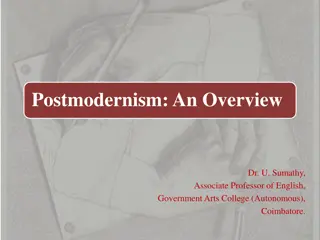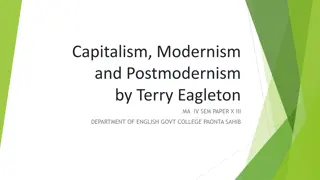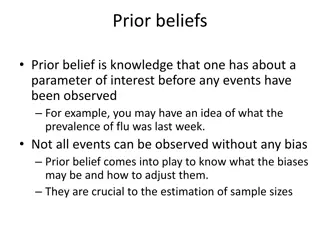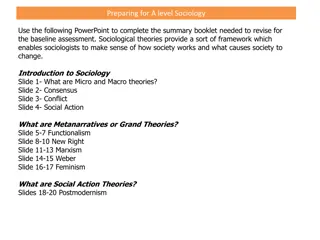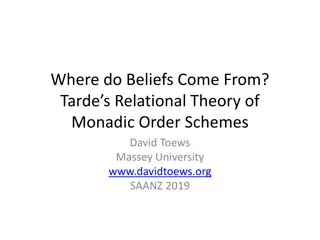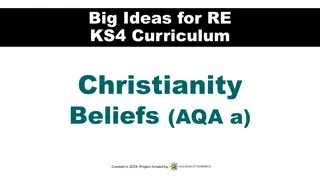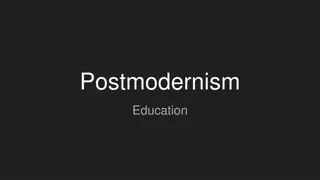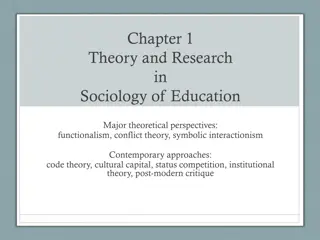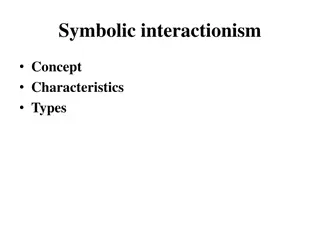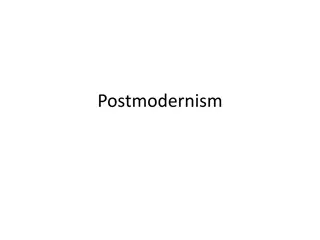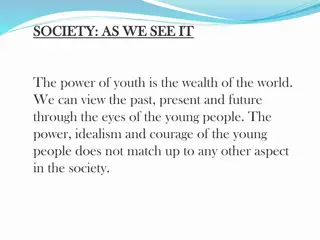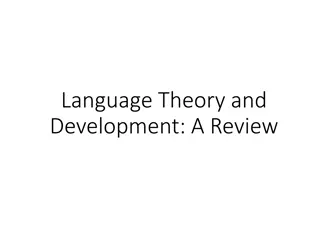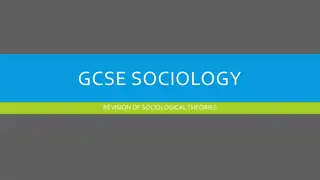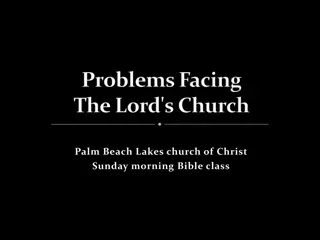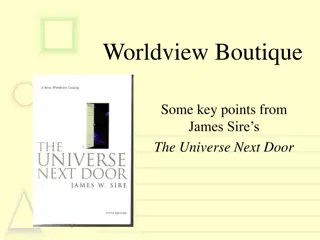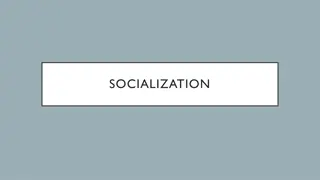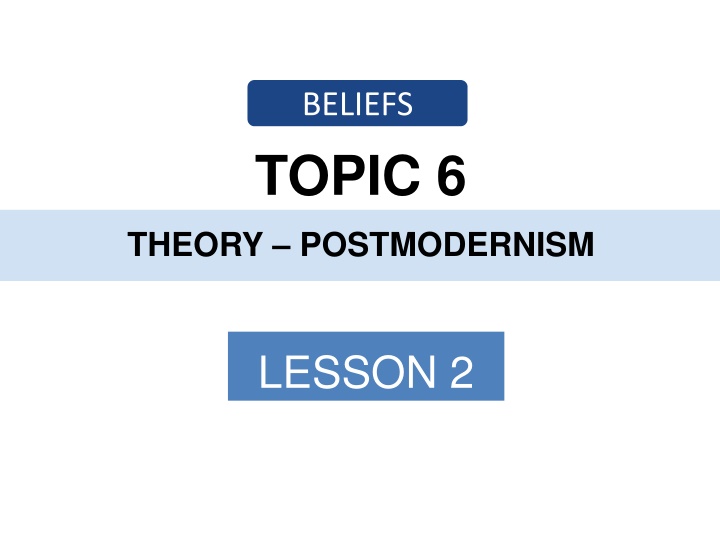
Postmodernism and Its Impact on Religion
Explore the theories of postmodernism and its influence on personal religious beliefs, societal changes, and the role of religion in modern times. Delve into the concept of rationalization, globalization, and religious diversity in a postmodern society.
Download Presentation

Please find below an Image/Link to download the presentation.
The content on the website is provided AS IS for your information and personal use only. It may not be sold, licensed, or shared on other websites without obtaining consent from the author. If you encounter any issues during the download, it is possible that the publisher has removed the file from their server.
You are allowed to download the files provided on this website for personal or commercial use, subject to the condition that they are used lawfully. All files are the property of their respective owners.
The content on the website is provided AS IS for your information and personal use only. It may not be sold, licensed, or shared on other websites without obtaining consent from the author.
E N D
Presentation Transcript
BELIEFS TOPIC 6 THEORY POSTMODERNISM LESSON 2
Do Now Task Study the graph below, what pattern is it showing about people s personal religious beliefs? S&C: Why might these patterns be as they are?
Do Now Task Study the graph below, what pattern is it showing about people s personal religious beliefs? S&C: Why might these patterns be as they are?
CWK: How do Interactionist and Postmodernists explain the role of religion? SOME A*/A: I can evaluate the usefulness of Interactionists and Postmodernists contribution to understanding religion today. MOST B: I can explain using sociological evidence how Interactionists and Postmodernists explain these changes. ALL C: I can identify features of religion and describe why religion has changed today. Key terms and definitions: Interactionism - examines how different social actors make sense of or interpret the behaviour of those around us. Postmodernism a belief that society now is based on more choice and individualism.
Task 1 The shift from a modern society to a postmodern society has impacted on a number of features within religion. The growing consumerism, globalisation and media communications had impacted on the nature of religious belief. Using the images below discuss what religion is like today. S&C: Is this a global issue?
Task 2 Berger s view of religion Rationalisation & religious diversity Study the cartoon strip below and explain how globalisation according to Berger has led to a disillusion with the world and religion. TASK: Now, draw you own version of the cartoon strip to explain the process. Disillusion: disappointment resulting from the discovery that something is not as good as one believed it to be.
MOST: I can explain using sociological evidence how Interactionists and Postmodernists explain these changes. Rationalisation Globalisation Plurality of life worlds Disillusion with the world Homelessness Secularisation/Anomie
Task 3 carousel task Using the information provided around the room with a partner find out information linked to the following key postmodern theorist Bauman Lyotard; Lyon; Herviru-Leger; Bunting; Davie; Hybridity. Write down what they say about religion in a postmodern world, if possible, include an evaluation for each. SOME: I can evaluate the usefulness of Interactionists and Postmodernists contribution to understanding religion today. MOST: I can explain using sociological evidence how Interactionists and Postmodernists explain these changes.
Task 3 Using the information provided and your textbooks (pg: 29+) with a partner find out information linked to the following key postmodern theorist Bauman Lyotard; Lyon; Herviru-Leger; Bunting; Davie; Hybridity. Write down what they say about religion in a postmodern world, if possible, include an evaluation for each. SOME: I can evaluate the usefulness of Interactionists and Postmodernists contribution to understanding religion today. MOST: I can explain using sociological evidence how Interactionists and Postmodernists explain these changes.
Bauman Bauman we are experiencing a 'crisis of meaning'. Traditional religions in particular seem unable to deal with this crisis. Consequently, newer expressions of religiosity have become more individualistic and more socially diverse. This enables individuals to restore meaning in their lives, without having to rely on established religious institutions imposing a monopoly of truth. This can be seen by the decline in religious monopolies and rise in NRM's + NAM's.
Lyotard Lyotard - claims postmodern society is characterized by a loss in confidence of 'meta- narratives' - the grand explanations provided by religion, politics, science & sociology. The 'truth' these subjects + belief systems claim to reveal have not been forthcoming.
Herviru-Leger Young people no longer have a fixed religious identity due to cultural amnesia (loss of collective memory) and not passing down religious traditions. Individual consumerism has replaced collective tradition, people have become spiritual shoppers and as a result, religion no longer acts as a source of collective identity that it once did.
Hybridity NRMs and NAMs are hybrid they mix different traditions. many combine Christianity with earlier religions. This hybridity appeals to our passion for choice we get the best of both worlds . Such hybridity involves an ecumenical view of beliefs themselves. A coming together of religions pluralism no universal cancelling out of different truths! Religions during modernity are similar to industry hierarchy, clear roles, mass recruitment but not technology. NAMs are more like postmodern organisation democratic, niche recruitment, use technology in a marketing manner, members can be flexible in commitment and use the religion to improve themselves.
Bunting Religious belief is becoming a DIY cocktail. Seasonal attenders Christmas and Easter. People are dipping into different beliefs and taking what most appeals to them, rejecting the beliefs when they no longer apply.
Davie Religion is taking a different, more privatised form. Believing without belonging people hold religious belief but don t go to church Vicarious religion a small number of professional clergy practice religion on behalf of a much larger number of people, who experience it second hand. Despite low attendance levels, people still use the church for rites of passage (weddings, funerals)
David Lyon Traditional religion is giving way to many new religious forms. Religion has become de-institutionalised with its signs and images detached from their place in religious institutions and instead floating on television and cyber space. We now have instant access to beliefs of previously remote places and religions-- >GLOBALISATION. The ideas have been disembedded by the media- lifted from original local context and placed elsewhere. ( Jesus in Disneyland ). They then become a cultural resource that individuals can change and adapt for their own purpose. We no longer have to sign up to any one religious tradition instead we can pick and mix elements of different faiths and make them part of our identity.
Task 4 Using the table summary like the one below, summarise the key information you have gathered from the research task. Theory/theorist What they say Evaluation Lyotard Bunting Lyon Davie Hybridity Herviru-Leger
Theory/theorist Lyotard What they say Evaluation Bunting Lyon Davie Hybridity Herviru-Leger
Plenary 3/4/5 Tell three people four things in five minutes.





